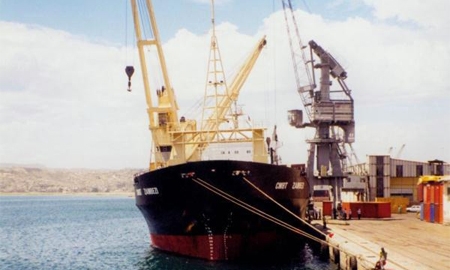Angola’s program of National Reconstruction of Infrastructure and Transport Systems is pumping big investments into the country’s second largest port,
Port of Lobito, in an attempt to resolve interruptions to the steady flow of imports which hinder the country’s economic activities, and address the tremendous impact the war had on both its infrastructure and its workforce.
Situated 30km north of Benguela City, Port of Lobito is of extreme importance to the economy as it handles 80 per cent of imports, mainly construction material and food. After Luanda, it is the second largest port in the country, a strategic entry point halfway down the coast, and the region’s point of reference for trade as it links to 1300km of Caminhos de Ferro de Benguela railway line.
More than $1 billion have been invested into reconstructing the region, including upgrading Port of Lobito to give it competitive advantages. Rehabilitation includes a multi-purpose terminal to increase handling capacity of general cargo and containers.
Jose Carlos Gomes, general director of Port of Lobito, recalls the end of the Civil War and how it brought the people together in a common purpose. “Since the 4th of April 2002, the country took the responsibility to be on the construction site, and you can see it is happening all over the country. Everybody is committed to the reconstruction of the country.”
Port of Lobito dates back to 1902, when important copper discoveries in Zambia and Zaire (modern day Democratic Republic of Congo) raised the need to build a transport network to get the copper from the inland areas to the coast, and from there ship it to Europe. Construction work on the huge Benguela Railway began, and Lobito was pinpointed as the ideal place to build a port to link to the railway. It officially received Commercial Port status in 1928.
Commenting on the port’s history, Mr Gomes adds: “The commercial port and the discharge of heavy cargo for the railroad were still working simultaneously, so only by separating the two was the port finally declared as a Commercial Port.”
“We want to position Port de Lobito as one of the best ports in Africa.” Ana Paz de Jesus Neto,
Chairman of the Board of Directors, Empresa Portuaria de Lobito
“Angola could be called the new Land of Opportunity.” Claudio Silva,
General Director of Porto Cargo |
More recently, in 2009, Port of Lobito’s strategic importance was highlighted when ships queuing to dock in Luanda’s port were forced to reroute to Lobito due to uncontrollable delays.
In face of increased prices of consumer goods caused by this type of situation, the country’s economy is moving towards diversification in order to reduce its overwhelming dependence on oil and diamonds. The port will play an important part in this process.
“We want to position Port de Lobito as one of the best ports in Africa, of the same standard as Dar-es-Salaam, Maputo and Durban,” explains Ana Paz de Jesus Neto, chairman of the board of directors of Empresa Portuaria de Lobito.
Mr Gomes comments on the importance of opening up to other countries. “Today, neighbouring countries have access to Angola, bringing their products and I believe that will continue. The government I belong to is also working to boost agriculture, and has already put guidelines in place to revive it, and so put an end to hunger and poverty. These objectives will only be accomplished through the work and improvement of infrastructure.”
Port of Lobito is undergoing major expansion and modernisation with new machinery under the supervision of China Harbour Engineering Company (CHEC). “There is no doubt that building the port is the best thing to do in Angola. It is impossible to calculate the national and international impact that it will have,” adds Mr Gomes.
China has had a long-standing relationship with Angola since the end of its Civil War, in terms of credit lines and bringing expertise and workers. Mr Gomes recalls Europe’s refusal to aid Angola in the past, but feels it is all water under the bridge: “We have our arms open to cooperate for mutual benefit as long as foreign investor show willingness to respect the laws laid down by the country.”
In fact, Angela Merkel’s recent visit to Angola last July, boosted the country’s confidence. Ms Neto recognises “that Germany is a key player in technology, equipment and management. It is very important as well in its know-how and the training it can give to our staff. Investments coming from Germany would be very welcomed as it would definitely help to develop the country”.
Lobito’s waters are naturally deep and it is also the shortest route from Angola to Europe, as well as the United States.
Foreign investment is very important for Angola and can bring with it technical know-how that will surely be of assistance to the future of the country. Claudio Silva, general director of
Porto Cargo, an Angolan-based company specialising in the international transportation of goods urges “all foreign investors to come to Angola, which could be called the new Land of Opportunity,” as it is undergoing a period of high economic growth, and enjoys political stability.
Porto Cargo gets its name from the Portuguese company it partnered with in 2005. The company specialises in freight, and needs Angolan ports to function efficiently.
Speaking of Porto Cargo in relation to Portugal, Mr Silva appreciates the importance of foreign investments, saying they are “very important for Angola due to the capital and expertise they bring. Angola has a deficit level of expertise, and prior experience of foreign companies in their countries of origin.”
However, Mr Silva is enthusiastic about the country’s investments in its ports, including Lobito, and is optimistic about their future. “This area of transport in the country is growing – in major ports we can see growth... More and more products are being exported.”

0 COMMENTS